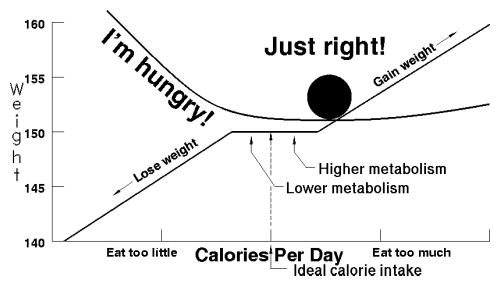
Bulky Buster envies Oscar. Buster's big, and with every passing year he seems to get a little bigger. For the most part he's healthy, although he gets winded easily, and happy, though he'd certainly rather not worry about his weight every day. Buster knows the odds: he's seen those ``Calculate your lifespan'' tables and even worked them out on occasion. Indeed, five years of life would be a wonderful reward for getting rid of those fifty extra pounds, if only there were any way of doing that. Disgust with being overweight, resolve to reduce, commitment to a plan...failure to keep the weight off, acceptance of failure as inevitable, resignation to a lifetime of overweight, denial of the consequences, surrender to the temptation of food: Buster has trodden this circle many times in attempts to control his weight. Why is it so hard for him? We need only look at his feedback chart.

Buster gets a clear signal every time he eats too little, but never hears a thing when he eats too much, unless it's enough to actually make him sick. Like Sam, like Oscar, like all of us, from time to time Buster's inclined to overeat. But nothing tells him to stop; not then, and not the next day. The extra calories show up, not as reduced appetite to compensate, but as pounds on the scale. Once that excess is stored as fat, the only way Buster can burn it off is by going hungry.
Buster feels like he's been dealt a lousy hand by life, and he's absolutely right. When he eats too little, he gets squawks from the stomach just as loud as Skinny Sam does, but when he errs on the other side, no alarm goes off. Many problems with Buster's feedback system can cause this, but the result is the same. While Oscar slowly drifts toward overweight, Buster feels himself on a Hellbound train, utterly unable to understand why he consistently packs on weight and powerless to control it other than by periods of deliberate starvation.
I do not mean to put down Buster! I spent most my life in this precise pattern of behaviour. What's ``wrong with Buster'' isn't a flaw of character. He's not inferior. He's just wired up wrong and, once he understands the problem as we now do, he can fix it.
One can imagine, before eyeglasses were invented, a culture that exalted those with 20/20 vision and disdained others who had difficulty seeing distant objects. (Imagine? Try becoming an airline pilot if your vision isn't perfect without glasses.) Poor vision might be attributed to ``flabby eyes,'' resulting from a lack of visual exercise. (The quack Bates method of vision correction persists in claiming this today).
Yet what distinguishes the near- and farsighted from those with perfect vision is but a minor difference in the shape of the lens in the eye. Before corrective lenses, those who couldn't see clearly were indeed handicapped. Think about it; would you be better off with one arm and able to see clearly, or with two arms but unable to focus on anything more than six inches from your face?
If Buster were born nearsighted, he'd wear glasses or contacts and never imagine himself a lesser man for doing so. He'd laugh, along with everybody, at a fool who suggested he throw away his glasses and apply all his will power to developing, instead, a ``natural sense of sight.'' And yet Buster's weight problem, like Oscillating Oscar's and yours and mine stems from just as simple a biological shortcoming as poor eyesight. Buster's built-in eat watch runs too fast, and as long as he relies on it he'll go on gaining weight. To solve his problem, he doesn't need to feel guilty, develop a ``stronger character,'' or change his lifestyle, any more than any of those things would have cured his myopia. No, Buster, like Oscar, like you and I, simply needs an eat watch to give him the feedback his body doesn't.
There are many ways in which an individual's appetite feedback curve can be related to calorie requirements but, as noted by the engineering aphorism, only three possible outcomes. Weight can blow up (gain constantly, like Buster), oscillate (Oscar's lose/gain rollercoaster, so familiar to many of us), or stay about the same (lucky Sam). If you flip the feedback curves in these charts left for right, you have depictions of an anorexic, an individual who tends to lose weight, and Sam. A multitude of reasons: organic, cultural, and psychological, may explain why feedback fails in certain people. Many diet books counsel searching yourself for the underlying causes of weight gain and remedying them. This may be an interesting and rewarding process, but it's no way to lose weight. It's kinda like becoming an expert watchmaker to fix your Timex that keeps stopping and nobody can seem to repair. The wiser man buys a new watch.
By John Walker